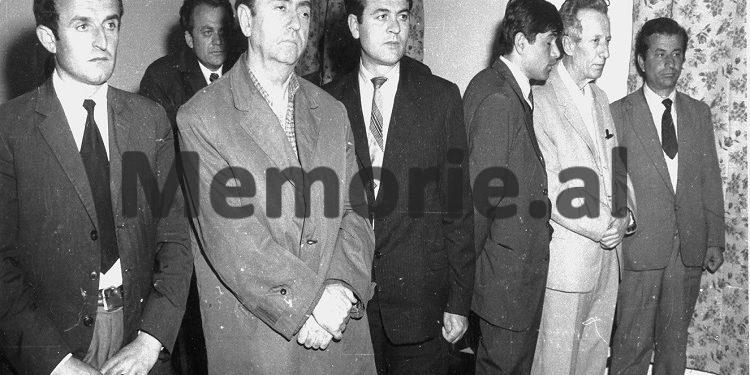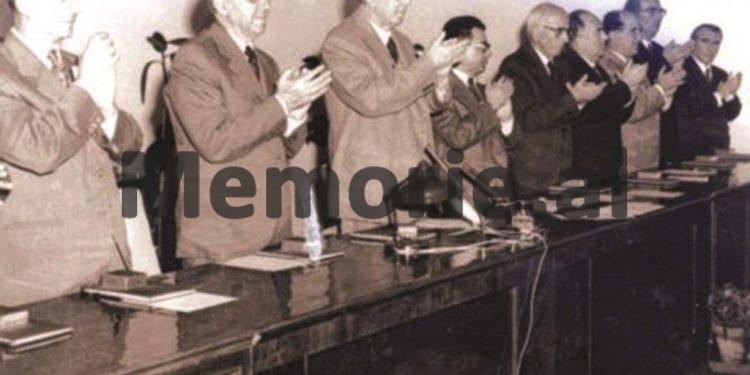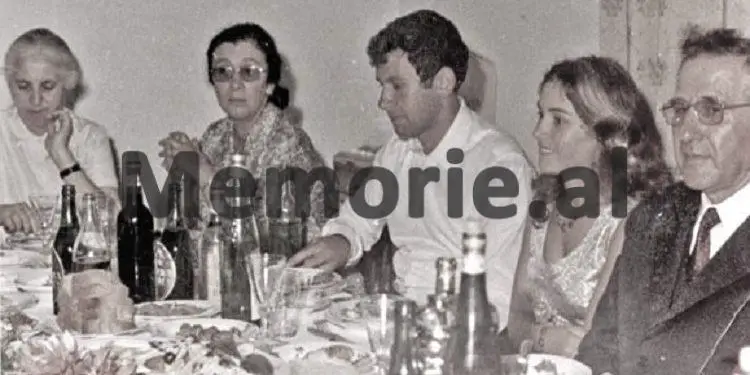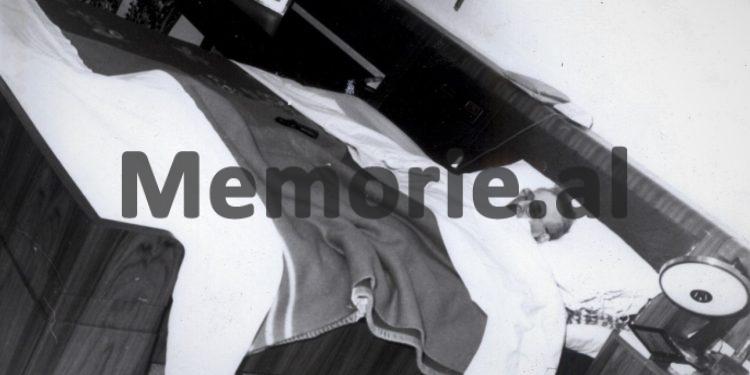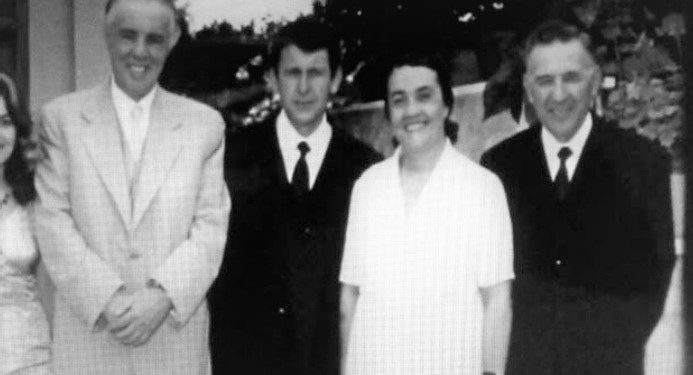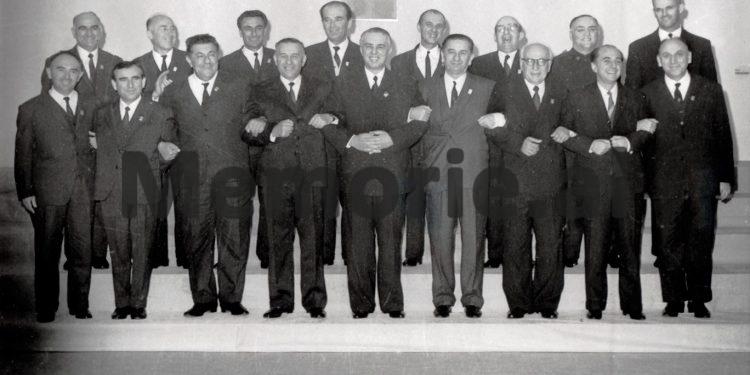By Fadil Paçrami
Part Eighteen
Memorie.al / What is prison? It is the place where those who have been sentenced to deprivation of liberty are kept, we would say by reading any dictionary. But that is little. Prison and freedom – two opposites. Previously: what is freedom? In short: to be free means to do what you want, to think and act as you wish in the exercise and fulfillment of your freedoms and rights, as a person and as a citizen, but always without harming and violating others. . Again: to think and act. We are talking about democratic freedoms, from those of speech, press, assembly and organization in various parties and associations, ensuring the conditions where ideas, requests and human wills can find expression and concretization, from those of the biological-related plan with the being itself, to those of the social plan, related to the ways of living.
Continues from last issue
Is this a coincidence? Then how? The engagement had to be broken and it was necessary to see how and why all this happened. There were a lot of questions that went beyond the boundaries of an engagement and marriage, reaching to himself and the CIA.
Mehmet Shehu immediately felt the blow. The signs had been given for a long time and he had noticed something as he had also felt the feeling of being somewhat alone. It was not clear that the entanglement was coming to an end. He started not to feel safe either in his own home (he was well-versed in eavesdropping techniques), or in the office or in relationships with others. Thus began the walks outside on the street and the chu-chu-chu conversations, only with his wife. At the VIII Party Congress, which opened at the beginning of November, where he delivered the report on the new five-year plan, as had happened from time to time, since he became prime minister, a cooling and division between them was noticed, so much so that there were delegates who expressed this openly.
Mehmet Shehu tried hard to attract their applause, often even raising his voice with inflated and pompous phrases, but he did not succeed. This was clearly seen by all. We also felt it there in prison, listening to the radio and from the press. Congress thus put the stamp on what the ustai had designed and added to the anxieties of the apprentice.
Enver Hoxha, as a behind-the-scenes master of this kind, after the congress, went on vacation for a few days and let him grind and eat with himself, in fact fall into depression and degradation. In the meantime, he had increased the surveillance measures, so that no one would do the wrong thing – get on the plane and run away somewhere. When he returned from Vlora by helicopter, those who happened to be present were impressed that he did not even say hello to Mehmet Shehu, who had also come out with the others to meet him, but sullenly and as if with anger, got into the car and left.
At the first meeting of the Political Bureau, which took place in those days, Enver Hoxha broke up the fight, openly and directly issued a series of criticisms and remarks against Mehmet Shehu, and invited others to do the same. Among the strictest, were Ramiz Alia and Kadri Hazbiu, not at all from their heads and they did not say a little. The meeting lasted until late. Suddenly Enver Hoxha said that; “everything that came out was really serious, we can’t end it tonight, so we’ll let it continue tomorrow.” Before leaving, addressing Mehmet Shehu, he said: “Many remarks were made to you and many issues were raised, you should think seriously, I know that this will be a difficult night for you.” That’s it, and they broke up.
He arrived home late, his family were anxiously waiting for him, but he didn’t stay with them, he said he felt tired and was going to sleep and went to his room. The next morning, although it was past seven, it was past eight, he was not getting up, when after a while the house was called, it was said that they had found him dead, covered in blood. No one heard the sound of a gun…! They saw guards everywhere, the Minister of Internal Affairs of that time, Feçor Shehu, also came, but they did not let him enter. Who had ordered this? Except for one word of Enver Hoxha, it could have such power. What had happened?!
Did they kill him?! Like who?! They say that in that house, when it was rebuilt and expanded, a secret entrance-exit to his room was created. It was also said that he had left and found a letter written by him, known and repeated so many times, with those who kill themselves. So, he killed himself?! Did they kill him?! Enigma! This is what Enver Hoxha wanted – his liquidation. In the evening, on the eight o’clock radio show, although the event was announced in the morning, news of suicide was given.
Whatever may have happened or been said, he met the end he deserved – that of an executioner, like all others before him. The important thing is to know not how, but why, for which I tried to throw, as much as has been said, some light. Others may know and say more and more precisely.
Paradox
Looking at the developments of these 50 years more deeply and with objectivity, it turns out that there have been not a few, but several paradoxes. There are indeed some things that contradict the previous official opinions and as much as I can like today, one or the other political force, not counting the extremes here. Something may seem strange, at first glance, as if there is something contradictory. But as the time, so are the conditions. Later, when analysis and reason feel freed from passions, nostalgia and revanchism, when logic is supported and acts on the basis of documents, history will be able to give accurate things, closer to the truth. This is the dialectic of events – more opposites.
It is important to find and evaluate the causes, determining factors, starting points and goals. I don’t know how much I can be able and clear, but as far as possible, without any pretense, rising above the prejudices of the time, I will try to give some opinion, as a person who lived for soon, some of the events that I will talk about, first with a critical eye, during the long years of prison, where I also knew the disappointments, as well as the concern that it does not continue as before even today, with the white and black I don’t set out, therefore, neither to tan, nor to whiten, nor to please anyone, nor because of circumstances.
I talked about time and conditions, what do I mean by these? – It was a time of antagonisms, confrontations and big clashes, in the world background: the division of influence zones and the cold war; whereas in the internal one: the wars for development paths and those for power. It cannot even be discussed outside of them. – The geographical conditions of the country are also decisive: at the crossroads between the East and the West; historical ones: divided in two as a nation, small as a country and threatened from many sides; undeveloped and poor; with old religious and provincial divisions, without democratic traditions and with pronounced feudal, even tribal, remnants. All these, I think, have their weight and should be taken into consideration, so that we can be as accurate and as close to the truth as possible. Without further ado, I will dwell on three of the weighty moments of those times, which have often attracted attention and been talked about the most.
(A clarification: whether we like it or not, talking about the past 50-year period, we are forced to deal with the political figures of the time, related to the main events determining the fate of the country, but always, differences must be made between causes, objective results and driving motives of subjective goals, which, as often happens, do not succeed, they even contradict.)
– 1948, the separation with Belgrade
I have talked about this above, listing events and facts, now I will focus on their assessment. It is known how the Communist Party of Albania was born, helped and under the tutelage of Yugoslavia; (there was a lot of talk about internationalism at that time and the common issue); the developments that the National Liberation War took in us, in terms of the similarity of the forms, means and goals, with those in Yugoslavia, as well as the submissive policy followed until that time, by the party and the new Albanian state that emerged from the war – it was going step by step , towards losing the country’s independence and returning to a seventh republic of Yugoslavia. This until February ’48, with the infamous VIII Plenum. But after only 2-3 months, everything changed. Why?! How?! Decisive and decisive here is: the breakdown of Moscow with Belgrade, this is not even discussed. There were two possibilities here:
Enver Hoxha, as the head of the party and the state at that time, would lean towards Belgrade and this would be the end of Albania as a separate state, an independent country; or would it lean towards Moscow and this would be the salvation, from this obvious danger. As you know, the second happened. It wasn’t easy at all, on the contrary, but that’s how it happened. This was a proof that not everything had ended, this evidence of the open opposition of the entire nation, at the extreme moment to the politics up to that time, an explosion of vitality, determination and courage to defend the independence of, its being with every condition and sacrifice.
So, there was an immediate reaction from the (communists), the wider masses, when it was openly spoken about what Belgrade represented at that time. Enver Hoxha knew this, he also understood where the chance for his existence came from, so he jumped on the side of Moscow, against Belgrade. Objectively, this was a turning point, saving for the country. I said objectively and I emphasize this, considering the result – Albania was saved, the whole country stood up and defended its independence, the country and the party and the state found strength and showed themselves, rejected a deeply wrong policy, undertaking a deep twist, as spoken.
The subjective motives of Enver Hoxha, to say it openly and unequivocally, were different. For a long time, especially after October ’44 in Berat, with the entry of the Sigurimi party into the hands of Koci Xoxes and the liquidation of Nako Spiros, in ’47, he had felt that the end was coming, so he did not leave it let this chance slip away, he held fast to it and, as in other cases, when he needed it, he showed maneuvering skills to achieve his own goals.
I think that this division: between the result for the benefit of the country – which constitutes the subjective side and the motives that led E. Hoxha to judge like that, – which constitutes the subjective side, should be made. They cannot be identified. Let’s throw away the dirty water, but not the baby that was born, it lives today, it will live in the future. That the subjective motives were the ones I talked about, this is also proven by the fact that the expected turn did not happen – it started, came numbingly and then gave up.
Enver Hoxha strengthened his positions at the head of the party and the state, came out as the savior of the situation, raised his own values, but did not say that he condemned and did not correct what had been done up until then, not even during the War, regarding with the real nationalist forces (not for the collaborators of the Italian and German fascist invaders, the Ballistas, the Zogists, etc.), nor for the trials after the liberation, nor for the punishments of the leaders of a more playful and democratic policy, such as Sejfulla Malshova, Nako Spiro , etc. We walked again on a dead-end road, Belgrade was replaced by Moscow, the isolation of the country deepened in the years that followed, it did not move to an independent, wiser and democratic policy, no matter how much was said about this.
– 1960s, secession from Moscow
I have talked about this above, how and how much it happened. But why? What was Albania for Moscow? Since in the last century, when the national states of the Balkans were born, the efforts and the struggle for the creation of the Albanian state began in our country, our country was without friends and supporters, and even had opponents and enemies, one of the fiercest was Russia of that time. Neighboring states in the northeast, those in the south, and those across the sea, before and after 2012, what did they do to separate any piece of Albania. Some even succeeded. And, as is well known, Russia has from time to time openly sided with the neighboring Slavic-Orthodox states, against an independent Albania, on its ethnic borders. A special negative role has been played for this by its old ties of Slavism and Orthodoxy, with the Balkan countries around us.
Even after the overthrow of tsarism and the victory of the Revolution of ’17, it appears that Moscow was not freed from these old ties and positions. Otherwise, how can you explain those attitudes that are so denying, and disdainful treatment from her in talks and tripartite relations; Anglo-Soviet-American, during the War and those beginnings after its end, leaving Belgrade under a kind of tutelage until ’48, non-acceptance or delayed entry into the Informbyro, the Warsaw Treaty and the KNER, as well as aid very limited, for the recovery and development of the country?
Albania deeply felt all this, even though it was never openly spoken about. There was, therefore, reason to be dissatisfied with this policy, not to mention that there was talk of Soviet friendship and assistance, going so far as to put up busts and photos of Muscovite leaders and flags of the Soviet Union everywhere, for years. successively, until the 60th, when the well-known secession from Moscow took place. It was not a coincidence that the whole country supported the taking of this step.
But even in this case, the true motives that led Enver Hoxha to do what he did, were still subjective. The Khrushchev phenomenon, which shook the foundations of the leading clans in the Soviet Union and in other socialist countries of the East, led to their downfall and change, and to some liberalizing measures in them, made Enver Hoxha feel the danger for himself, so he reacted in that way. Shouts for; “betrayal of Marxism-Leninism”, “revisionism”, and others were masks, facades. What was the result, how can it be evaluated?
Unlike the case with Yugoslavia, I say that here both pluses and minuses must be distinguished – that there were both. Plus – that we were breaking away from that kind of unbearable dependence and subjugation, so much so that there was no question of a sovereign state; those conditions were created for relations with other, equal countries. People believed in this and the possibilities were. So it was a chance, if it had been used and exploited. But this did not happen, it remained a possibility and that’s it.
Minuses – that the isolation of the country was further deepened, repressive measures were increased, it was passed to further restrictions on the freedom of the individual to the unprecedented attack on religion. All these came to be increased during the 60s and 70s, with the proportions that reached the prisons and exiles among the ranks of the communists and their families, the persecution of intellectuals, strikes and austerity measures against young people, for fashion, the degeneration and corruption of the rulers, the loud curses, against liberalism and foreign influences.
All of these clearly speak and reinforce, as was said above, the difference between objective results and true subjective motives and goals, which encouraged and guided the dictator, in the actions he took at that time. The 80s, until the revolution. After the trials of the 70s, the break with China in 78, the events of the 80s, the lid was put on. In this period, until the beginning of the 90’s, when the overthrow happened, you can no longer talk about pluses, but only minuses, because despite the death of Enver Hoxha, everything that was done was aimed only at ensuring continuity.
Enver Hoxha, sensing his end, not only that his health was failing him, but also from the shocks of the dictatorship, thought about the continuity, to whom he should leave his legacy. He didn’t trust Mehmet Shehu, who had been his right-hand man for years, because he was as wild and unpredictable as he was thirsty for power and glory, so he liquidated him, with that masterful game of trickery. , as I explained above.
Enter Kapo, the faithful but unskilled and sub-mediocre servant, was dead. Kadri Hazbiu, the guard dog, who was badly compromised by the exploits and crimes of the Security. So, he chose Ramiz Ali, who had kept him close for the last few years, even though he watched his indecision and acrobatics with concern. How he gave all the orders and served him well, he also put a support behind him – Nexhmijen, I entrust him with the inheritance. It was not in vain that he swore, from the first days, about continuity.
It is difficult to say that whatever would have happened if he had left Mehmet Shehu as an heir – he would have drowned this country in blood, or Ceausescu would have ended, but the choice he made, in terms of the results, did not have any plus for the country . The demagoguery and tricks of Ramiz Ali, to extend the life of what he had inherited and to push forward the democratic processes, which at that time involved all the countries of the East, made us the last to accept pluralism.
Another is what is said by him, in his writings and speeches, he tried to present himself in court recently, another is what happened with the transition without much pain in the democratizing developments of the country. The results are one thing, while the motives that led him, as in the cases mentioned above, were different: he was not in favor of the way events took and led to the overthrow of the Enverian dictatorship, but he had nothing to hold back. well, what to do; he was also weak and scary and he did everything to save as much as possible from the Usta’s legacy, with his skin. The accounts didn’t work out, that’s different.
Aren’t these, indeed, some of the paradoxes of time? There are others, but why am I going on? And all this, in the name and for whose sake? Of socialism that degenerated into dictatorship – into a totalitarian regime with the consequences that are already known…?! This is difficult for all those who believed, fought, worked and sacrificed for his ideas, but time – this judge, as fair as she is strict, spoke strongly about this. I say these things with pain today, like many, many others, because I fought for them since I was young, during the Anti-Fascist National Liberation Movement and then, well…! Life does its own thing, it doesn’t ask you whether you want it or not, whether you like it or not and who you are.
The fact remains what it is. This is also a paradox, that we paid dearly, who before and who after, who more and who less, the whole country paid for it. This was not supposed to be the reward, but… Truth is the daughter of time, says a proverb. So, we tell these truths, looking at them as they are, as lessons from history. They are certainly not cut with a knife and should not be taken simply in black and white. Based on these, no one can deny the National Liberation War, its values and saving role for the destinies of the country, as one of the most glorious pages of our national history. Memorie.al
The next issue follows




